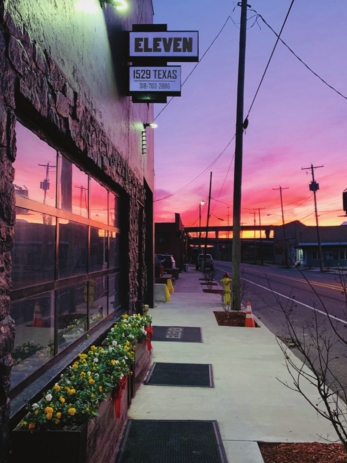Lessons From Texas Avenue

Can we become comfortable with chaos through incremental changes?
Shreveport’s downtown and core neighborhoods are a frustrating and encouraging mix of successes and challenges. When individuals try to make a difference by redeveloping our core, they often face unique challenges that are very different from “greenfield” developments on the edge of town. Extending infrastructure through farmland or forest to develop new land can be very expensive. Yet, it is a much simpler task than clearing title, finding existing utilities, fixing a historic structure, or meeting zoning requirements in the core of our city.
 Curtis Carlson, former president and CEO of SRI International, a prominent technologist and pioneer in innovation best practices, states that “top-down innovation is orderly but dumb; bottom-up innovation is chaotic but smart.” This phrase has been applied by Strong Towns to describe the ways that cities operate. While chaos can, at times, be uncomfortable and hard to control, it often produces the outcomes we want much more effectively than attempting to white-knuckle the outcomes we want through regulation. It’s counter-intuitive, but once understood, can have a powerful effect on the way we redevelop our city.
Curtis Carlson, former president and CEO of SRI International, a prominent technologist and pioneer in innovation best practices, states that “top-down innovation is orderly but dumb; bottom-up innovation is chaotic but smart.” This phrase has been applied by Strong Towns to describe the ways that cities operate. While chaos can, at times, be uncomfortable and hard to control, it often produces the outcomes we want much more effectively than attempting to white-knuckle the outcomes we want through regulation. It’s counter-intuitive, but once understood, can have a powerful effect on the way we redevelop our city.
Texas Avenue provides some great insight into this idea. It began as the Texas Trail from Shreveport to Dallas and became a major commercial corridor in Shreveport’s early 20th century. When the focus of transportation started to shift to the interstate system, this portion of the Texas Avenue corridor became segmented and cut off by many of the major roads we use today, and many parts of the corridor are now abandoned. However, there has been some positive change in this area over the last five years.
One of Texas Avenue’s pioneers is LeMar Flukers, a business owner and developer. LeMar started as a real estate agent but got into development by noticing a concerning trend: There was a lack of new retail and development in low-income neighborhoods. LeMar decided to take matters into his own hands by constructing a strip mall on Jewella Avenue. In the process, LeMar learned that he could complete his own projects much cheaper by building them himself. Today, LeMar is an established developer in Shreveport’s core neighborhoods.
LeMar is very familiar with chaos – his transition from real estate to construction wasn’t easy or planned, but he’s been able to create something cohesive from his efforts. His most wellknown project – Eleven Events, LLC – is a great, renovated indoor-outdoor space in which he hosts weddings, social events and food truck nights. Unfortunately, he’s had his struggles with regulations, like having events shut down because licensed food trucks didn’t submit applications to park at his property that night. Requirements like this, while likely implemented to maintain order, often inhibit the innovation that our city needs.
LeMar’s next venture, the Louisiana Daiquiri Cafe, was born out of inspiration from his friend Johnathan Reynolds. Johnathan had been to daiquiri bars in New Orleans, so he and LeMar decided to go into business together and buy another building on Texas Avenue for this concept. They bought an old commercial building on the corner of Texas Avenue and Pierre to create the cafe; step by step, a new entertainment district is being developed by their incremental actions.
There are new projects on the horizon for LeMar; however, the fear of
chaos is impacting his plans once again. Along Texas Avenue, many
buildings don't meet the requirements for parking that our city code
dictates. This isn't a surprise — these buildings are from a different
era, and many have horse hitches along their frontage. So what then —
should all of our city be regulated to look like Youree Drive? Or can we
accept a little chaos to allow momentum to keep building?
Just around
the corner, Herby K's is benefitting from the changes in the area. As a
result of the Daiquiri Cafe, Herby K's general manager, David Doe, gets
to share his menu with the customers who go to Daiquiri Cafe. In turn,
the cafe can point people to a food spot after they are clone with
their neighborhood-named daiquiris. It's a customer-base mixing
operation that can have significant effects 10-15 years into the future.
What if we could create a regulatory environment that allowed this
change — even when chaotic — to continue to happen? Every building put
back to use can expand our tax base, lessen the strain on our police
department by putting "eyes on the street," and ease the load on the
fire department by reducing calls to burning vacant buildings. We can
get to the outcomes we want, but only by building incrementally,
step-by-step, figuring it out as we go. Folks like LeMar can help with
the innovation if we let them.
Tim Wright is a professional
engineer, resident on Texas Avenue and founder of ReForm Shreveport, an
advocacy organization dedicated to spurring action and promoting best
practices in Shreveport's downtown and core neighborhoods.
